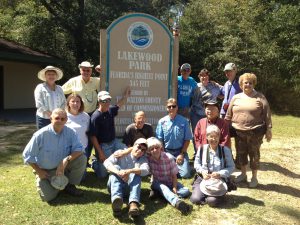
A Florida Master Naturalist Uplands class visits the highest point in Florida, located in Walton County. Photo credit: Carrie Stevenson, UF IFAS Extension
For many Floridians, gardening is a window into learning the cycles of the natural world. Understanding pollination, distinguishing beneficial insects from harmful ones, creating compost, or knowing what time of year to apply iron supplements are important for a gardener to be successful. While we have our share of campers, hikers, and kayakers, over the years Extension agents have found that some of our best Master Naturalist students are those with fond memories of farming or gardening as children or adults.
If you have always been fascinated by the natural world and how plants, animals, and people interact, you might be a perfect candidate for the Master Naturalist program. Offered periodically in almost every county in Florida, this adult educational course combines classroom sessions with field instruction, typically over a six-week period. At graduation, students present an original project, which may vary from creating an exhibit, a children’s book, or even an environmental non-profit organization.
Master Naturalist students vary in backgrounds from retired military and teachers to park rangers and college students. Many Master Gardeners find the courses a helpful addition to their training, and utilize their newly gained knowledge when working with clientele. At completion, students receive an official Florida Master Naturalist certificate, pin, and patch.
The traditional 40-hour courses cover Upland, Coastal, and Freshwater Wetland habitats, while the newer “special topics” cover Conservation Science, Environmental Interpretation, Habitat Evaluation, and Wildlife Monitoring. A new “restoration” series has begun with the Coastal Restoration class, which kicked off in Escambia and Santa Rosa counties and is currently being taught in Bay. Extension agents will be offering several classes in the Panhandle this fall—check out the FMNP registration site to see when a class will be offered near you!
- The Assassin Bug–A Beneficial Garden Visitor - January 15, 2026
- Wax Myrtle–a Native Evergreen - December 26, 2025
- Yucca–A Tough and Versatile Native Plant - November 26, 2025
